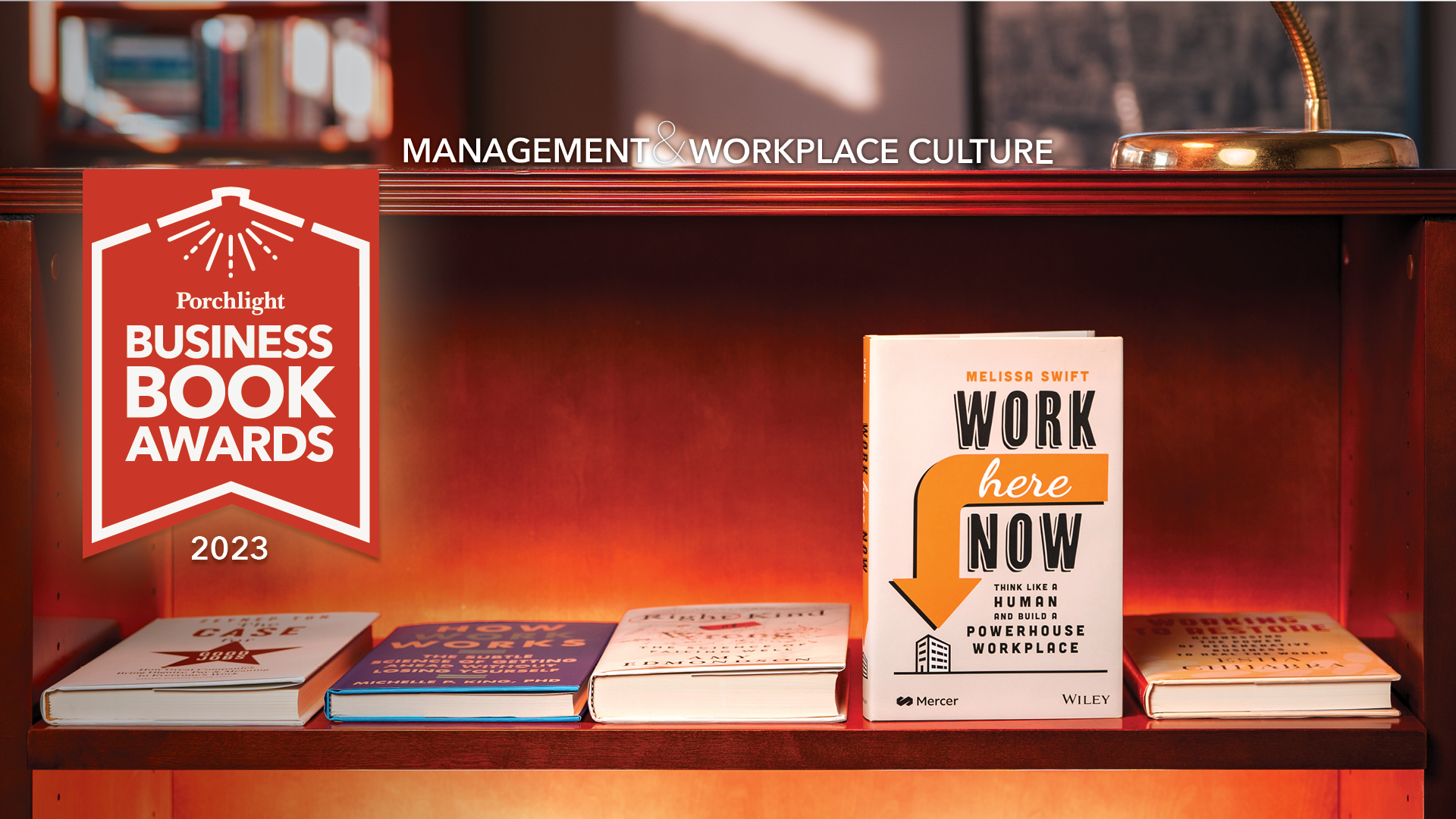Work Here Now | An Excerpt from the Management & Workplace Culture Category
Melissa Swift's Work Here Now qualifies as an old-school business book in it's actionability and (count 'em) ninety bullet-pointed strategies it offers. But while it takes on a serious topic and need, Swift doesn't take herself too seriously, is genuinely funny, and writes with an honesty and informality that is refreshing. The following excerpt comes from near the book's ending, when she is wrapping up why the strategies and work she lays out is so important, and looks toward "What’s Actually at the End of the Rainbow: Toward an Achievable but Exciting Future of Work."

When I talk to clients about the “future of work,” there’s a constant tension. In the wake of the most intense parts of the pandemic, there is a true and distinct hunger to do things differently: in our 2022 Global Talent Trends Research, 41% of C-suite executives agreed with the statement, “The fundamental shift in our business required a complete reset around work, the workforce and the workplace.” Everything from labor shortages to a rocky digital transformation journey has made it clear to organizations that what got us all here won’t get us any further. Every organization is, in some way, keen to change how they leverage their most vital resource: their people. My impressive colleague, Kate Bravery, has written extensively about “the rise of the relatable organization,” organizations that succeed because, per our research, they do the things employees tell us make them thrive: making people feel valued for their contributions, engineering work that’s fulfilling, creating a workplace where people have fun, and engendering a sense of belonging, among other things. Every single one of my clients, without question, has vocally expressed the desire to be a more relatable organization—and they mean it.
At the same time, due to the same difficult journeys across everything from pandemics to racial justice to just implementing a darn tech system that works, at this point in history, we’re all realists. Engage folks at any organization about the exciting array of possibilities, and eventually you hit a point in the conversation where someone says, “This is all great, but what can we actually do today?” Especially as the economic future remains uncertain—with recession quite possibly on the horizon—the pragmatic beats the futuristic, every time.
We could deride this nagging voice as coming from a place of fear and incrementalism, but I actually look at this line of thinking differently. The quest for practical, implementable solutions that can be brought to bear right here, right now, is the greatest and most exciting aspiration we can have. For years we’ve grabbed for the lowest hanging fruit—everything from changing the titles of jobs but not the content to rote spans-and-layers cost takeouts to endless tweaks to pay without rethinking the philosophy of what the work is we’re paying people for. We’re in a moment now where we want to reach higher, so let’s go for it. Let’s bring the aspirational and the achievable together, marry up economics and empathy, and swing for the fences with our bats squarely in our hands.
Here are a few thoughts on how to do so, with a movie or TV quote for each. We’ll start with my favorite movie from childhood—the only videotape we owned for years—The Wizard of Oz. At the film’s conclusion, Glinda the Good Witch tells Dorothy, “You had the power all along, my dear,” as all Dorothy had to do to get home to Kansas was click her heels three times. That’s every organization—we have had the power all along. We just get caught up in day-to-day exigent business realities and don’t take the much-needed step back to ask critical questions. Are we treating our human workers fairly? Kindly? Are they doing the right work, in the right way? Could we actually make more money if we did all of these things correctly? I’m betting on yes, and so should you. Believing you had the power all along is crucial.
On a related note, I’d also like to cite Oscar the Grouch here: “You’d be a grouch, too, if you lived in a garbage can.” We spend an incredible amount of time these days trying to figure out why workers are quitting, when the answer is relatively obvious: because modern organizations were not built intentionally; in many cases, they are messy, frustrating, inconsiderate, and exhausting places to work. Sort some of these pieces out, and many of what we think of as individual issues—everything from broken performance to attrition to deep-seated needs for leadership development—would start to resolve with astonishing speed. We can, and should, build a better mousetrap—we could fundamentally change the economics of so many industries if we could simply get work done differently.
The final quote is, of course, from Office Space: “Human beings were not meant to sit in little cubicles staring at computer screens all day, filling out useless forms, and listening to eight different bosses drone on about mission statements! We don’t have a lot of time on this earth! We weren’t meant to spend it this way!" It’s a hilarious rant, and it’s also just deep-down true. As long as we believe work is supposed to suck, it’s going to suck. Our deeply held beliefs that work should somehow be soul-deadening and even dangerous to our health are number one with a bullet on the list of reasons why work can be soul-deadening and often dangerous to our health. The dirty little secret is that these beliefs actually hold back things like growth, profitability, and productivity too.
Let’s explore a world where work sucks just a little bit less.
Excerpted from Work Here Now: Think Like a Human and Build a Powerhouse Workplace.
Copyright © 2023 by Mercer (US) Inc.
Reprinted with permission of Wiley.
All rights reserved.



